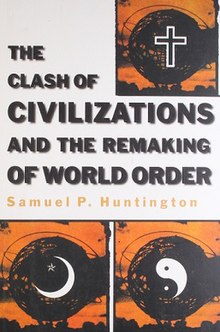Clash of civilization
 |
|
| Author | Samuel P. Huntington |
|---|---|
| Publisher | Simon & Schuster |
|
Publication date
|
1997 |
| ISBN | |
| OCLC | 38269418 |
The Clash of Civilizations is a hypothesis that people's cultural and religious identities will be the primary source of conflict in the post-Cold War world. The American political scientist Samuel P. Huntington argued that future wars would be fought not between countries, but between cultures, and that Islamic extremism would become the biggest threat to world peace. It was proposed in a 1992 lecture at the American Enterprise Institute, which was then developed in a 1993 Foreign Affairs article titled "The Clash of Civilizations?", in response to his former student Francis Fukuyama's 1992 book, The End of History and the Last Man. Huntington later expanded his thesis in a 1996 book The Clash of Civilizations and the Remaking of World Order.
The phrase itself was earlier used by Albert Camus in 1946, and by Bernard Lewis in an article in the September 1990 issue of The Atlantic Monthly titled "The Roots of Muslim Rage". Even earlier, the phrase appears in a 1926 book regarding the Middle East by Basil Mathews: Young Islam on Trek: A Study in the Clash of Civilizations (p. 196). This expression derives from "clash of cultures", already used during the colonial period and the Belle Époque.
Huntington began his thinking by surveying the diverse theories about the nature of global politics in the post-Cold War period. Some theorists and writers argued that human rights, liberal democracy, and the capitalist free market economy had become the only remaining ideological alternative for nations in the post-Cold War world. Specifically, Francis Fukuyama argued that the world had reached the 'end of history' in a Hegelian sense.
...
Wikipedia
